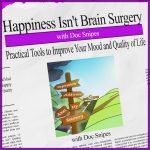
Dialectical Behavior Therapy Techniques
Emotion Regulation
Presented by: Dr. Dawn-Elise Snipes Executive Director, AllCEUs
Podcast Host: Counselor Toolbox & Happiness isn’t Brain Surgery
Author: Journey to Recovery (2015) & Happiness Isn’t Brain Surgery (2017)
Objectives
~ Define emotion regulation
~ Identify why emotion regulation is important and how it can help
What is Emotion Regulation
~ Emotional vulnerability refers to [situations] in which you are more emotionally sensitive or reactive than others
~ What makes people more reactive
~ Current vulnerabilities (including stress)
~ Differences in the central nervous system and HPA Axis
~ Different learning experiences
~ Degree to which something conflicts with your beliefs about how the world “should” be
The HPA-Axis
~ Hypothalamic Pituitary Adrenal (HPA) axis is our central Threat Response System
~ When it is activated it causes cortisol to be released
~ Cortisol causes
~ Blood glucose to increase
~ Wake-up/Excitatory chemicals and hormones to be released
~ Stimulation exhaustion
~ Sex hormones to be SUPPRESSED
~ Anxiety
~ Poor sleep
~ Depression
Basic Threats
~ Loss of control/The unknown
~ Rejection/Failure
~ Death
The Brain and Stress
~ When there is a chronic threat to safety and a constant underlay of anxiety
~ You brain makes connections from your experiences and prunes away connections that are not utilized.
~ If 5 out of 6 of your last friendships ended poorly, and one is still going, what is your expectation of that relationship?
~ People who feel a lack of control over their environment are particularly vulnerable chronic stress
~ Abused and neglected children or adults
~ Adults with anxiety or depressive disorders
The Brain and Stress
~ The hypervigilant state activated by stress:
~ Disrupts the ability to focus and learn
~ Impairs the ability to form new memories and recall information (Do you really learn much when you are highly stressed or feeling threatened?)
~ Is associated with emotional and behavioral dysregulation.
~ You remember the unpleasant things
~ Have difficulty recalling the pleasant ones
~ Have difficulty exploring alternate possibilities
= STRESS
Chronic Stress and Hypocortisolism
~ When people are under chronic stress, the brain
~ May stop getting as stressed about each individual thing to prevent overload
~ Conserves excitatory brain chemicals for the fight or flight response
~ When it perceives a threat/stressor worth responding to, it responds extremely strongly. (dysregulation)
Chronic Stress and Hypocortisolism
~ By reducing chronic stress, over time your brain will
~ Recover and rebalance and quit staying in survival mode.
~ Become more able to access positive memories
~ You will be more able to tolerate distress and explore stressors from the wise-mind.
~ Form new, positive memories
Section Summary
~ Emotional dysregulation results from high emotional vulnerability due to
~ long-term stress
~ Invalidating environments
~ If you grew up in an invalidating environment, you may have never developed the tools to deal effectively with your emotions
~ This created a source of constant stress for you which only intensified your emotional reactions.
Section Summary
~ Under stress your brain does not learn or retrieve memories as effectively
~ When you are feeling unpleasant emotions, you notice and remember things that support those feelings.
~ Emotional dysregulation activates the Threat Response System which:
~ Disrupts the ability to focus and learn
~ Impairs the ability to form new memories and recall new, contradictory, positive information
Section Summary
~ Emotion Regulation involves eliminating or mitigating vulnerabilities in order to allow the brain to rebalance and get out of survival mode.
